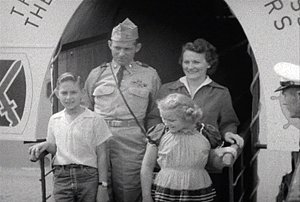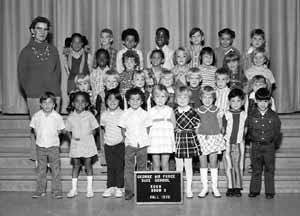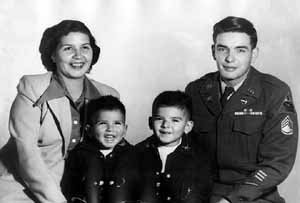Jump Cut
By George T. Marshall, RIIFF Executive
Director/CEO
(April 2006) When I was
child, I was very fortunate to have been able to travel
around the globe. My father, you see, was in the Navy
and he was stationed in a number of exotic locales.
The family traveled with him. As a matter of fact, we
spent four and a half years in Japan prior to his retirement
and those memories are still strong for me today as
though I was there last week.
Now I know, it was a while ago. Friends, being less
than charitable would say all this happened when dinosaurs
ruled the world. In truth, it was more like the late
1950s.
 I
was recently sent a documentary film to review that
brought back many memories associated with my chilhood.
It’s called “BRATS: Our Journey
Home.” The film is about American
military “brats” who share intimate memories
about their strange, but interesting childhoods - growing
up on military bases around the world, then struggling
to fit into an America with which they have little in
common. I
was recently sent a documentary film to review that
brought back many memories associated with my chilhood.
It’s called “BRATS: Our Journey
Home.” The film is about American
military “brats” who share intimate memories
about their strange, but interesting childhoods - growing
up on military bases around the world, then struggling
to fit into an America with which they have little in
common.
Strongly and creatively directed by Donna Musil, the
film hit home.
“BRATS: Our Journey Home” is a seven-year
work of passion and independent filmmaker Musil’s
directorial debut. A former lawyer and daughter of an
Army JAG officer, Donna’s writing credits include
“Ananse,” a children’s animated film
in development in London/Ghana; Rebuilding America’s
Communities, the PBS/Carter Center documentary about
inner-city poverty; and “To Kingdom Come,”
a feature drama about union-busting labor lawyers featured
in NY Women in Film & Television’s Screenplay
Reading Series representing "some of the best developing
women screenwriters."
I’ve been on the Japan Brats website (http://japanbrats.blogspot.com/)
repeatedly during the past year after hearing from someone
I had known while a child on the Yokosuka Naval Base.
Musil’s film found in me a receptive and appreciative
audience. Who knew that others shared my experiences
or even cared. Musil’s film reminded me what it
had been like growing up in so many different communities;
not quite fitting in with the locals and never in one
place long enough to form solid friendships.
 SO
JUST WHO ARE THE BRATS? SO
JUST WHO ARE THE BRATS?
Brats are children of military personnel.
How Many Brats Are There? The truth is, nobody knows.
In a country obsessed with polls and statistics, neither
the Department of Defense (DoD) nor anyone else has
kept a running count of the number of children raised
in the U.S. military. And you can’t tell just
by looking. They’re every race, every age, every
religion. They’re everywhere. They’re your
spouses, your parents, your grandchildren, your co-workers,
and your neighbors.
The DoD school system estimates it has educated around
4 million brats overseas since 1946. But that’s
only 20-30% of the total brat population, so you’re
looking at a total of at least 12-20 million brats.
That’s not counting the children of National Guard
men and women… embassy and foreign service personnel…
DoD civilian employees… missionary families…
and mobile corporate families – all of who share
more in common with military brats than with their fellow
citizens.
Because brats are not easily identifiable, marketing
to this “lost American tribe” (as author
Pat Conroy calls them), is a challenge, but not impossible,
particularly in the United States. Statistics indicate
almost 60% of all military brats live in 10 states:
Texas, California, Florida, Virginia, Georgia, Colorado,
North Carolina, Maryland, Arizona, and Washington.
The film is narrated by Kris Kristofferson, himself
an Air Force Brat. Kristofferson as a (Singer/Songwriter
is known for BROKEN FREEDOM SONG, MOMENT OF FOREVER,
"Me and Bobby McGee," THE HIGHWAYMEN; and
as an Actor for LONE STAR, A SOLDIER'S DAUGHTER NEVER
CRIES, HEAVEN'S GATE, A STAR IS BORN.
 “BRATS: Our Journey Home” features Interviews
with: General H. Norman Schwarzkopf, Army Brat, Retired;
Mary Edwards Wertsch, Army Brat, Author, Military Brats:
Legacies of Childhood Inside the Fortress; Stephanie
Donaldson-Pressman, Psychotherapist, Author, The Narcissistic
Family; Morten Ender, Sociology Professor, U.S. Military
Academy, West Point, Author, Military Brats and Other
Global Nomads: Growing Up in Organization Families;
George H. Junne, Army Brat, Chair, Department of Africana
Studies, University of Northern Colorado, Blacks in
the American West and Beyond—America, Canada,
and Mexico.
“BRATS: Our Journey Home” features Interviews
with: General H. Norman Schwarzkopf, Army Brat, Retired;
Mary Edwards Wertsch, Army Brat, Author, Military Brats:
Legacies of Childhood Inside the Fortress; Stephanie
Donaldson-Pressman, Psychotherapist, Author, The Narcissistic
Family; Morten Ender, Sociology Professor, U.S. Military
Academy, West Point, Author, Military Brats and Other
Global Nomads: Growing Up in Organization Families;
George H. Junne, Army Brat, Chair, Department of Africana
Studies, University of Northern Colorado, Blacks in
the American West and Beyond—America, Canada,
and Mexico.
(No, I wasn’t interviewed.)
When asked why she developed the film, director Donna
Musil told me:
“The idea for a non-fiction film about military
children took root back in 1998. I was a labor-lawyer-turned-struggling-writer
feeling a bit out of sorts and “different”
from my fellow Americans, but didn’t know why.
Then one day I discovered I was not alone. There are
literally millions of us military “brats”
scattered around the world and more are being born every
day. We are raised in a separate and distinct culture
that affects us deeply in both positive and negative
ways.
“Making this connection to my culture gave me
a sense of belonging I had never experienced, which
in turn gave me the strength to focus less on “why
I was the way I was” and more on how I could use
the positive aspects of my cultural inheritance to make
the world a better place. This was indeed revelatory
and empowering to a little girl who had moved twelve
times on three continents, attended three high schools,
and lost a father to cancer by the time she was sixteen
years old.”
I could certainly relate to what she had felt.
Being a child in a military family not only gives you
a different perspective on the world around you, but
also can be an isolating experience.
 Making
the film was an experience in itself. According to Ms.
Musil: Making
the film was an experience in itself. According to Ms.
Musil:
“It has been one roller-coaster of a ride. Seven
years later, we have a film about a group of children
whose only “homes” are really each other.
We actually seem to have more in common with the military
children and “global nomads” of other countries
than with our fellow citizens. And wouldn’t that
be ironic and yet oddly hopeful, that the children of
soldiers who fought each other end up belonging to an
almost borderless nation of people?”
What of her goals for the film?
“And that, I suppose, is my hope and my vision
– that this little film might be a small spark
in a global fire of self-awareness and belonging –
that from the ashes of war might rise a nation of children
committed to peace. If we can put a man on the moon...
if we can dissect the human genome into its infinitesimal
parts... surely we can find a way to live peacefully
with our differences. It's a lofty goal, to be certain,
but then again, we military brats are raised on lofty
goals.
Amen!
For more information about this
title, contact:
Brats Without Borders, Inc.
P.O. Box 3096
Eatonton, GA 31024
Phone: 404.358.2525
Email:
info@bratsourjourneyhome.com
LEMONADE STORIES
Another documentary I was sent that touched a strong
chord was the locally produced “Lemonade Stories:
by Mary Mazzio.
“Lemonade Stories,” is an amazing new film
about extraordinary entrepreneurs and their mothers.
It blew me away with its focus and straightforward storytelling.
If ever there was an accessible documentary, this was
it. The story is universal and who can’t relate
to the impact on their life by a mother?
This film, produced in collaboration with Babson College
and Scott Timmins, focuses on how mothers have contributed
to the entrepreneurial spirit of their sons and daughters,
as well as the influence these mothers have had on their
children in terms of instilling a responsibility to
give back to the community. The film, aired nationwide
on CNNfn and the debut of the film's panel discussion
aired nationwide on C-SPAN.
Garnering a full cover page story in USA Today, complete
with pictures and streaming video on USA Today.com's
home page, “Lemonade Stories” was also featured
in cover story articles in The Christian Science Monitor
and Forbes.com, both of which stories were syndicated
around the world, including a feature story on ABC News.com's
home page, as well as NPR, CNN Headline News, ESPN,
The Boston Globe, Fast Company, Bloomberg Radio, The
Providence Journal, Yahoo Business, MSN Business, among
others.
The film has been screened and used for international
consulting firms, unemployment training centers, state
business conferences, high schools (being incorporated
into high school economics curriculum in school districts),
entrepreneurship symposiums, business schools and colleges
in the US, Canada, Japan, the UK, China, Mexico, Brazil,
and France.
The individuals featured in this film include:
• Richard Branson
(The Virgin Group) and his mother, Eve Branson (herself
an entrepreneur, who also served in WWII)
• Russell Simmons (Def
Jam/Phat Fashions), his brother Reverend Run (a/k/a
Run of the hip-hop pioneers, Run-DMC), and his brother
Danny Simmons (co-founder, Def Poetry Jam)
• Arthur Blank (The
Home Depot) and his mother, Molly Blank (who took over
the family business after the death of her husband and
built it into a multi-million dollar operation)
• Kay Koplovitz
(USA Network) and her mother, Jane Smith (a 90 year
old who loves Brett Favre and is known to yell at her
favorite players during playoff season)
• Tom Scott (Nantucket
Nectars), his mother Jane, his grandmother Dorothy (featured
in Nantucket Nectars' radio spots), and his wife, Emily
Woods Scott (founder of JCrew)
• Billy Starr (Pan-Mass
Challenge), who founded the world’s largest bike-a-thon,
raising over $100,000,000 for cancer research in memory
of his mother, Betty Starr.
• Kelly Reinhart
(TPak International), an 11 year old entrepreneur who
invented a thigh pack and obtained a million dollar
contract with the US Army.
SOME BACKGROUND ON THE FILM’S DIRECTOR
Not only was Mary Mazzio the film’s Director,
but she was also the Screenwriter, Producer, and Executive
Producer. Now that’s a hyphenate!
Ms. Mazzio, an award-winning director, former Olympian,
and entrepreneur, is Founder and CEO of 50 Eggs, Inc.,
an independent film production company in Massahusetts.
Mary wrote, directed and produced the highly-acclaimed
films, “Lemonade Stories,” “Apple
Pie” and “A Hero for Daisy.”
The latter film, “A Hero for Daisy” was
hailed by The New York Times as a “landmark film”
and “fantastic” by Sports Illustrated; “remarkable”
by NPR; aired nationwide on ESPN, Oxygen, WGBH, and
WTSN-Canada; and is in thousands of classrooms across
the country.
“Apple Pie” aired nationwide on ESPN to
critical acclaim, and was called “warm and illuminating
– told with deftness and emotion… priceless”
by The New York Times; “heartwarming” by
Los Angeles Times; “fantastic”- NPR, and
“excellent: - CNN.
Mary, a former Olympic rower (1992-Rowing) and member
of several US rowing teams, is a graduate of Mount Holyoke
College and Georgetown Law School. A recipient of several
awards including the 2001 Women's Sports Foundation
Journalism Award, a Gracie Award, a Henry Luce Foundation
Fellowship (to Korea); the Mary Lyon Award (from Mount
Holyoke College); a Rotary Foundation Graduate Fellowship
(to France).
I heartily recommend this film and believe it is a great
teaching tool.
For more information, please contact
50 Eggs Films
231 Forest Street, Babson Park, MA 02457
http://www.50eggs.com
 About the Author:
About the Author:
George T. Marshall is the Producing Director of the
Rhode Island-based Flickers Arts Collaborative, the
creators of the annual Rhode Island International Film
Festival for which he also serves as Executive Director.
He teaches film and communications at Rhode Island College
and speech communications and documentary film at Roger
Williams University. He is a director, writer, producer
of commercials and industrials for numerous business
clients in the region and is currently completing the
multi-media components for a museum exhibit saluting
American veterans in Woonsocket, RI. He can be reached
at <info@film-festival.org>
|